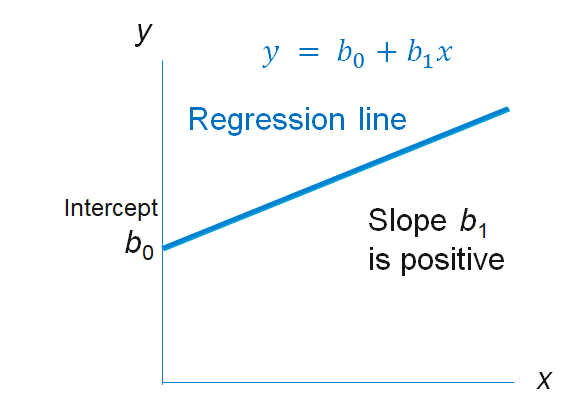
Exhibit 34.25 Simple linear regression.
As mentioned in Section Relationship between Variables, the covariance and correlation statistics provide a measure
of the strength of the linear relationship between two variables.
Regression analysis is a technique which further examines the relationship between
variables. It models the relationship between one or more independent variables (predictors or
explanatory variables) and a dependent variable (response variable) and explains or predicts the
outcome of the dependent variable, as a function of the independent variables.
The two basic types of regression are simple linear regression and multiple linear
regression. Simple linear regression models the relationship as a linear function of one
independent variable, whereas multiple regression uses two or more independent variables.
Simple linear regression (Exhibit 34.25) takes the following functional form:
$$ y = b_0 + b_1x + e $$
Multiple linear regression takes the form:
$$ y = b_0 + b_1x_1 + b_2x_2 + b_3x_3 + ... + b_t x_t + e $$
y: is the dependent or response variable.
x, xi: independent variables (predictors or explanatory variables).
b0: intercept.
bi: regression coefficient is the slope of the regression line.
e: error term
Once the relationship has been determined, the regression equation can be used to
visualize, explain, and predict how the dependent variable responds to changes in the independent
variables.
For instance, if you are studying the impact of consumer promotions, regression will
explain how price discounts for an item and its competitors affect the sales of the item. It provides a
measure for the discount price elasticity of demand and the cross-discount-price elasticity of demand,
as well as the impact of displays and other in-store influences.
Based on this understanding, you can construct a “due to” analysis to explain the
outcome of past marketing initiatives or develop a “what-if” analysis to predict or simulate the impact
of proposed initiatives. These analyses are covered in Section
Sales Decomposition and Due-To Analysis
and Section What-if Analysis of Chapter Promotion.